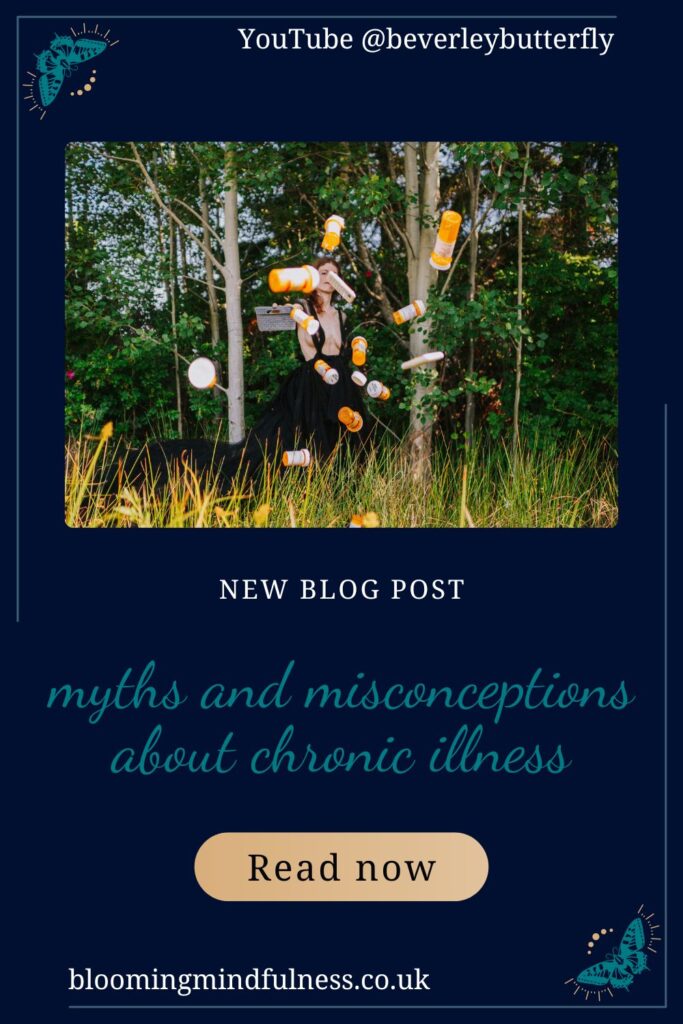
Myths and misconceptions about chronic illness
There are many myths and misconceptions about chronic illness, and they can really affect those of us who have them. Family, friends, and even medical professionals can treat us differently because of the things they assume. We have even experienced this in our government, which is surprising after Covid, so let’s dig into the facts.

Why do people assume things?
Society is very much influenced by the media they ingest and the people around them, we see this a lot when people are far left or right. Often, they do not have the facts to back up their beliefs, it is just something they read online, or their friends told them.
The problem with this, is that people are not taught to critically look at what they are reading, watching or who they are listening to. So, instead of finding out if something is true or not, they believe whatever they have read or heard.
I don’t think I realised this until I became sick at first, they thought it was an infected insect bite and I was given antibiotics. But as soon as my illness started to look long-term the attitudes of the doctors and nurses started to change.
This was especially apparent when I had to give up work and where I was living and move home again. Suddenly I was looked at as if I was addicted to painkillers or looking for an excuse not to work.
The truth was that I was in pain, I was struggling to relearn to walk with numbness spreading through my limbs and struggling with my mental health. I wanted to go back to living in my own space and working as a nurse.
I had just started to find my feet and I was in a loving relationship and had some nice friends, plus I was in a city which was full of life. The last thing I wanted to do was give all that up and yet as I tried to get the right benefits, and to find work I came up against so many people with myths and misconceptions about chronic illness that were stopping me.
My memories of that time are full of trauma, I was struggling to keep my mental health on an even keel, and yet finding compassion was almost impossible. These assumptions and societal conditioning were leaving me with everyone viewing me with suspicion.
It even got so bad, that I started to doubt myself, was I sick enough to need mobility aids? Was I in so much pain that I needed medication? Did I really need to stop working I had only tried about 10 jobs, maybe if I kept looking?
Many people with chronic illness have these doubts or feel pressure to struggle through in jobs that make them sicker because they feel they ‘aren’t sick enough’. Internalised ableism is definitely something we all struggle with because of this conditioning and the doubts and suspicion we are viewed with.
My memories of that time are full of trauma, I was struggling to keep my mental health on an even keel, and yet finding compassion was almost impossible. Share on XWhat are these myths and misconceptions about chronic illness?
We just don’t want to work
- Myth – the assumption that everyone with chronic illness is lazy and just don’t want to work is rampant. Even friends will say, not you of course, but my aunt’s next-door neighbour is on benefits, and he works. Of course, there will always be someone who will be like this, but is it fair to assume everyone on disability benefits is like this? Even Labour and Conservative governments have made comments that are similar as well which of course doesn’t help the bias.
- Fact – I have not met anyone who is disabled or chronically ill who wouldn’t rather have the money a full-time job would bring than be on benefits. I tried several different jobs and kept losing them because I couldn’t keep up, or was having too much time off, or I just couldn’t do it because I was sick. In fact, in 2024 the rate of fraud reported when it came to PIP was so small it is assessed to be 0%.
Only the elderly are disabled
- Myth – Many times I see people on social media, mention that someone has said to them ‘but you are too young to be sick’ or ‘you are too young to need a walking stick’. It has happened to me a lot, even medical professionals have asked me why you have a walking stick or walker at your age! To say this is silly when we know as a society that people can be born with disabilities, or be in accidents, get illnesses etc and yet still the idea that only the elderly are allowed to be disabled prevails.
- Fact – There are 16million disabled people in the UK, 11% are children, 23% working age and 45% pension age. These facts from Scope, show that though the majority are due to age, there are still significant amounts of people of all ages who are disabled. They also state that disabled people are almost twice as likely to be unemployed than non-disabled, which shows we need to make work much more accessible before suddenly trying to force disabled people into work!
Chronic illnesses are always visible
- Myth – I am one of the people where you cannot see my disability, I am not paralysed, nor have I lost a limb which are acceptable reasons to be disabled to most people. I have what we call a dynamic disability which means it changes a lot in severity and so I use different mobility devices on different days. This often confuses people as they watch me get out of my wheelchair and turn it into a walker, as if I am faking. It also makes it hard to fill in forms for benefits as it’s hard to say an average experience when every day is different.
- Fact – A survey in Canada showed that of the 6.2million people with disabilities over the age of 15, 61% had some kind of dynamic disability. This included illnesses that get worse over time, as well as ones that fluctuate or have periods where the illness is not experienced. So, taking pictures or video of people to post online of them out of their wheelchair is not the gotcha moment you might think it is.
If we go out we can’t be that sick
- Myth – I often struggle to go out, and I rarely leave the house, but when I do I try to have the most fun I can. I dress up, put on make up and try to make the most of it because it is a rare thing. However, we often feel judged by people around us for going out to have fun because surely if we can do that, we can work, right?
- Fact – When I am going out, I have to rest for days before and after, I have to carefully plan everything I eat and drink as well as when I shower as all these things use up energy I will need. Disabled people are human beings just like anyone, we have friends, and we want to enjoy life. We often feel we walk a tightrope of expectation, if we just sit around, we are lazy and if we go out with friends occasionally or have a hobby then we must be well enough to work. The difference is that hobbies and going out can be planned for and rest and recovery can be worked in. If we had full time work, that would take all of our energy and we would have nothing left to live our lives with, and it would probably make us sicker.
There are so many myths and misconceptions about chronic illness, I only covered four of the most common I have seen and experienced. I hope that it will help you to think more critically and to be a little more compassionate. Let me know in the comments some of the misunderstandings you have come across so we can burst some together.
Thank you xx
If you enjoy what I do, please support me on Ko-fi as a one-off tip or on Patreon for just £2 a month! that can help me keep my YouTube & blog going xx





2 Comments
Kaz
Being signed off work due to work related stress doesn’t mean I need to hide at home. To get me out, my friends took me to the cinema one evening. I went from sitting alone at home to sitting in a bigger room with my friends and other people. It really helped my mental health. This happened a number of years ago and to this day I am still grateful to my friends.
If you see a person being given a piggy back, it maybe that person cannot walk anymore due to an illness. This happened to a friend of
one of my friends. Her boyfriend gave her a piggy back when needed. It meant she could still go out on occasion, and not have to stay at home all the time.
admin
That is such a good point, sometimes we just need to grab a piggy back from a friend or partner to make it home xx